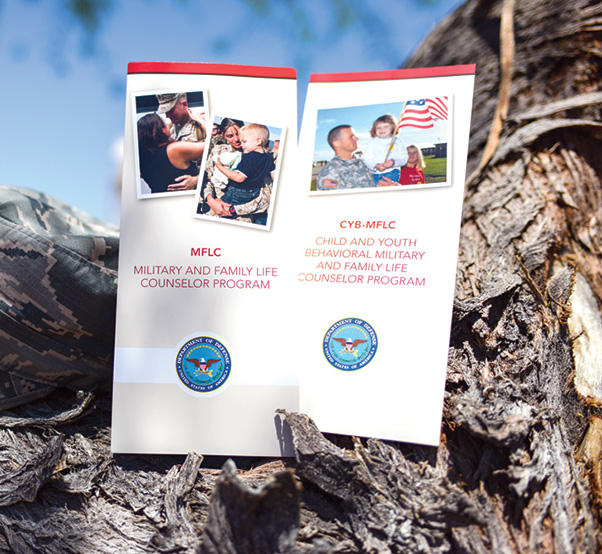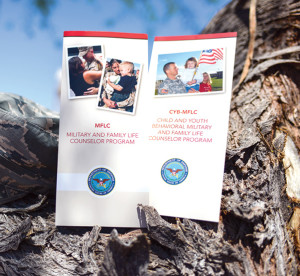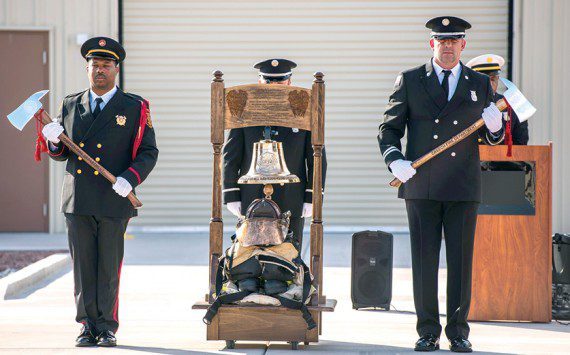Brochures for the Military and Family Life Counselor Program rest on a tree at Nellis Air Force Base, Nev., June 1. The MFLC program offers short-term, non-medical counseling at no cost to active-duty service members, National Guard and reserve service members (regardless of activation status) and their families, as well as Department of Defense civilian expeditionary workforce
members and their families.
NELLIS AIR FORCE BASE, Nev.— Military members may face a number of unique challenges related to their service, including difficult duty assignments, long separations from loved ones, combat stress, deployments and others. Many service members also contend with issues at home that may affect their families, jobs, and local communities.
The military offers a wide variety of programs to help individuals learn valuable skills to help them deal with these issues. One of these programs is the Military Family Life Counseling Program.
“One of the challenges facing the Air Force community is the loss of Total Force Airmen to suicide,” said Carla Diamond, Airman and Family Readiness Center section chief. “Multiple efforts have been deployed to address suicide prevention. One of the latest is the optimization of the MFLC program resources to increase support and education within units and across the base.”
According to Diamond, these efforts were put in place after the Air Force Suicide Summit which occurred earlier this year and their focus on Targeted Resilience Outreach. Surge MFLCs were offered to all Air Force installations and both Nellis AFB and Creech AFB chose to take advantage of this opportunity.
The MFLC program offers short-term, non-medical counseling at no cost to active-duty service members, National Guard and reserve service members (regardless of activation status) and their families, as well as Department of Defense civilian expeditionary workforce members and their families.
MFLC offers trained, licensed professional counselors for service members and their families to speak with free of charge for up to 12 sessions. All information shared with the counselors is kept strictly confidential and off the record, except to meet legal obligations or prevent harm to self or others.
“These (surge) counselors will be in place for 90 days with an option to extend them for additional 90-day rotations through January 2017,” said Diamond. “The Surge MFLCs will be embedded into the units and address specific local issues as identified by the Community Action Information Board and Integrated Delivery System team. Their starts dates are May 31 and June 13 at Nellis and Creech, respectively.”
Counselors are there to help with a variety of common concerns that occur within the military lifestyle, including: anger, anxiety, loss or grief, relocation adjustment concerns, including homesickness, separation, stress reactions to the deployment cycle and stress reactions to reintegration and the transition from warrior to civilian life.
“In addition to the Surge MFLCs, there are also rotational MFLCs assigned to the Nellis and Creech Airman & Family Readiness Centers as well as Nellis Child Development Centers,” said Diamond. “These MFLCs have been active for several years and rotate every 6 months. A major difference between them is the rotational MFLCs will not be embedded in the units and are not tasked specifically to provide direct support to CAIB/IDS initiatives.”
The licensed professional counselors that are a part of MFLC also understand the unique challenges that one faces as part of the military community. They can help individuals manage better throughout that next deployment or figure out the best way to talk to your kids about another move. They can also provide compassionate support and resources to help you throughout the grieving process if you have lost a loved one.
According to Health Net Federal Services, counselors typically make contact during pre- and post-deployment training, but may approach military members and their families in places such as libraries, local restaurants or bowling alleys. Regardless of how you meet them, MFLCs are there to talk to and help with life’s challenges. It is an opportunity to reach out and speak confidentially with someone about your thoughts and needs. Services are free and confidential they are between you and the counselor.
According to Military One Source, if an individual is interested in the MFLC program, but is concerned that doing so will impact one’s career or your service member’s career, consider this: choosing to seek non-medical counseling through the MFLC program has no impact on a service member’s security clearance, and information disclosed during a counseling session with an MFLC is kept confidential. Service members and family members can see an MFLC without anyone in the command or chain of command knowing about it. All information shared with the counselors is kept strictly confidential and off the record, except to meet legal obligations or prevent harm to self or others.
“Everyone should know the MFLCs are an easy resource to access,” said Diamond. “They make their own appointments and you do not need to meet them in the office. They can provide their sessions at other locations upon request. Further, they do not maintain case notes or any records so there is no documentation.”
The contact numbers for MFLCs are: Nellis Surge MFLC: 702-423-2996, Nellis MFLCs: 702-274-4184 and 702-274-4249, Nellis Child & Youth MFLC: 702-539-4357 and 702-274-3082 Creech MFLC: 702-274-427.













